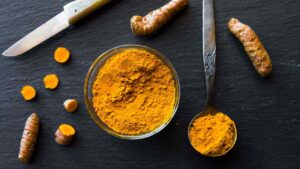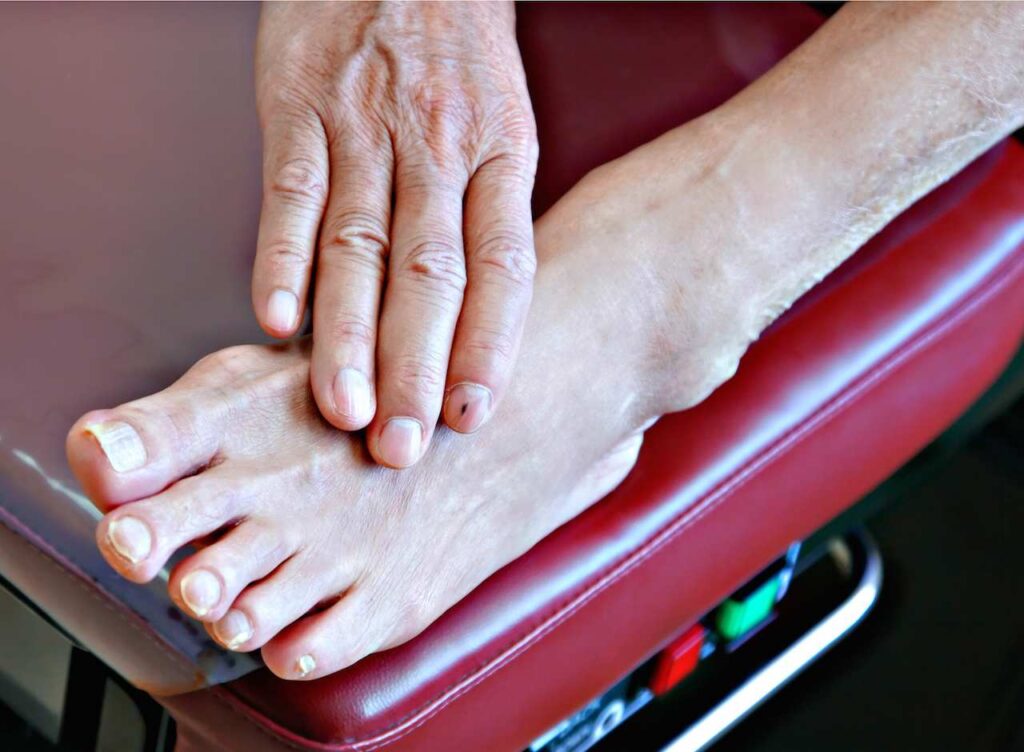Diabetic neuropathy characterized by nerve damage due to high blood sugar levels, manifests through symptoms like pain, tingling, and numbness, primarily in the feet and hands. While modern medicine offers various treatments, an increasing number of individuals are turning towards herbal remedies to complement their management plans. In this blog, we will explore the world of natural herbs for diabetic neuropathy that have shown promise in soothing discomfort and enhancing the quality of life.
Contents
How Are Natural Herbs For Diabetic Neuropathy Helps?
 Natural herbs for diabetic neuropathy can offer several benefits, providing relief from symptoms and potentially improving overall nerve health. Here’s how some of these herbs help in managing diabetic neuropathy:
Natural herbs for diabetic neuropathy can offer several benefits, providing relief from symptoms and potentially improving overall nerve health. Here’s how some of these herbs help in managing diabetic neuropathy:
- Anti-inflammatory Properties
Chronic inflammation plays a significant role in the development and progression of diabetic neuropathy. Herbs with anti-inflammatory properties can help reduce inflammation, potentially alleviating nerve pain and discomfort.
- Antioxidant Effects
Oxidative stress is another contributing factor to nerve damage in diabetic patients. Antioxidants can neutralize free radicals, reducing oxidative stress. Alpha-lipoic acid, a naturally occurring compound found in certain foods and supplements, has strong antioxidant properties and has been shown to improve symptoms of neuropathy by protecting the nerves.
- Pain Relief
Some herbs contain compounds that act as natural pain relievers. For example, capsaicin (from chili peppers) can be applied topically to the skin to reduce pain sensations.
- Improving Blood Circulation
Poor blood circulation can worsen the symptoms of diabetic neuropathy. Herbs like Ginkgo biloba enhance blood flow. This is crucial for delivering nutrients and oxygen to the nerves, potentially aiding in their repair and health.
- Nerve Regeneration
Certain herbal compounds might stimulate nerve growth or regeneration. Although more research is needed, early studies suggest that herbs like ashwagandha and lion’s mane mushrooms could support nerve health and recovery.
It’s important to note that while natural herbs can offer benefits in managing diabetic neuropathy, they should not replace conventional medical treatments. But rather be used in conjunction with them.
What Are Some Natural Herbs For Diabetic Neuropathy?
 Natural herbs for diabetic neuropathy offer a holistic approach to managing the symptoms associated with this condition. Here’s a look at some of the most promising herbs known for their potential benefits:
Natural herbs for diabetic neuropathy offer a holistic approach to managing the symptoms associated with this condition. Here’s a look at some of the most promising herbs known for their potential benefits:
Alpha-Lipoic Acid (ALA)
Alpha-lipoic acid is a naturally occurring compound that serves as a powerful antioxidant in the body. For individuals with diabetic neuropathy, ALA has been a subject of interest due to its ability to improve neuropathic symptoms. It works by enhancing nerve blood flow, reducing oxidative stress, and improving the conductivity of neurons. Clinical studies have suggested that ALA can significantly reduce symptoms such as pain, burning, tingling, and numbness in the limbs.
Feverfew
Feverfew is a medicinal plant traditionally used for its anti-inflammatory and pain-relieving properties. Although more commonly associated with the treatment of migraines, Feverfew’s potential benefits for diabetic neuropathy stem from its ability to reduce inflammation—a key factor in the development and progression of neuropathic pain. By inhibiting the release of substances that cause inflammation, Feverfew may help to alleviate the discomfort associated with nerve damage.
Ginkgo Biloba
Ginkgo Biloba is renowned for its circulatory benefits, making it a potential ally in the management of diabetic neuropathy. Poor circulation can exacerbate the symptoms of neuropathy by depriving nerves of essential nutrients and oxygen. Ginkgo Biloba’s ability to enhance peripheral blood flow may help improve the delivery of oxygen and nutrients to nerve tissues, potentially reducing symptoms like pain and tingling.
St. John’s Wort
Best known for its antidepressant effects, St. John’s Wort also contains anti-inflammatory and analgesic properties that may benefit individuals with diabetic neuropathy. The herb works by modulating neurotransmitters that are involved in pain perception, which could help in reducing the intensity of neuropathic pain. While its use for depression is well-documented, the application of St. John’s Wort for nerve pain relief is an area of growing interest, suggesting a versatile role in natural pain management strategies.
Capsaicin
Capsaicin, the component that gives chili peppers their heat, is used topically in the form of creams and patches to relieve pain by depleting the substance P—a chemical involved in transmitting pain signals to the brain. For people with diabetic neuropathy, capsaicin offers a direct approach to pain management by reducing the sensitivity of pain receptors over time. Although the initial application may cause a burning sensation, regular use has been shown to decrease the intensity of neuropathic pain, providing a significant benefit for those seeking alternative pain relief methods.
Turmeric (Curcumin)
 Curcumin, the active ingredient in turmeric, is celebrated for its potent anti-inflammatory and antioxidant effects. In the context of diabetic neuropathy, curcumin’s ability to mitigate oxidative stress and inflammation could play a crucial role in protecting nerves from further damage. Research indicates that curcumin may help in reducing the biochemical processes that lead to neuropathic pain, offering a complementary approach to managing the condition.
Curcumin, the active ingredient in turmeric, is celebrated for its potent anti-inflammatory and antioxidant effects. In the context of diabetic neuropathy, curcumin’s ability to mitigate oxidative stress and inflammation could play a crucial role in protecting nerves from further damage. Research indicates that curcumin may help in reducing the biochemical processes that lead to neuropathic pain, offering a complementary approach to managing the condition.
Ashwagandha
Ashwagandha is an adaptogenic herb known for its ability to help the body manage stress. Beyond its stress-reduction benefits, ashwagandha has shown promise in experimental models for its potential to treat neuropathic pain. The herb may exert its effects through anti-inflammatory pathways, reducing the inflammation around nerves and thus, alleviating symptoms of diabetic neuropathy. But, ashwagandha’s direct impact on diabetic neuropathy requires more clinical research.
Peppermint Oil
Peppermint oil applied topically, provides a cooling sensation that can temporarily relieve the pain associated with diabetic neuropathy. The analgesic properties of peppermint oil are attributed to menthol, a compound that can help soothe discomfort by activating certain receptors in the skin that produce a cooling effect. This can be particularly beneficial for managing the burning and tingling sensations that often accompany neuropathy.
These natural herbs and compounds offer a spectrum of benefits that can support the management of diabetic neuropathy. Their use is ideally in conjunction with conventional treatments and under the guidance of a healthcare professional.
What Are the Best Foods That May Heal Nerve Damage?
 Certain foods are rich in nutrients that support nerve health and may aid in the healing process of nerve damage, often resulting from conditions like diabetic neuropathy. Incorporating these foods into your diet can contribute to overall nerve health:
Certain foods are rich in nutrients that support nerve health and may aid in the healing process of nerve damage, often resulting from conditions like diabetic neuropathy. Incorporating these foods into your diet can contribute to overall nerve health:
- Leafy Green Vegetables: Spinach, kale, and other leafy greens are high in B vitamins, particularly vitamin B6 and folate, which play a crucial role in nerve health. These vitamins help create neurotransmitters and maintain the protective sheaths that cover nerves.
- Nuts and Seeds: Almonds, walnuts, flaxseeds, and chia seeds are excellent sources of omega-3 fatty acids and magnesium. Omega-3s are vital for repairing nervous tissue, while magnesium helps regulate nerve function. Additionally, nuts and seeds are good sources of antioxidants that protect nerves from oxidative stress.
- Fatty Fish: Salmon, mackerel, and sardines are rich in omega-3 fatty acids. And known for their anti-inflammatory properties and ability to repair damaged nervous tissue. Regular consumption of fatty fish can support nerve healing and maintain healthy nerve function.
- Whole Grains: Foods like brown rice, quinoa, and whole wheat products are rich in B vitamins and fiber. B vitamins, particularly B1 (thiamine) and B12, are essential for nerve health and regeneration. They help in maintaining the myelin sheath and reduce the risk of nerve damage.
- Berries: Strawberries, blueberries, raspberries, and blackberries are packed with antioxidants, such as vitamin C and flavonoids. This protects nerves from damage caused by free radicals. Their anti-inflammatory properties also help reduce inflammation that can exacerbate nerve pain.
- Avocados: High in B vitamins and healthy fats, avocados support nerve health by promoting the repair of damaged nerves. The monounsaturated fats in avocados also help keep the myelin sheath that protects nerve cells intact.
- Sweet Potatoes: Rich in antioxidants like beta-carotene and vitamin C, sweet potatoes help combat oxidative stress on the nervous system. They also provide a healthy dose of B vitamins and magnesium, supporting nerve function and repair.
Incorporating these foods into your diet can contribute to the health of your nervous system. Hence, potentially aiding in the healing of nerve damage.
Conclusion
In conclusion, navigating the complexities of diabetic neuropathy can be challenging. But incorporating natural herbs for diabetes neuropathy like Alpha-Lipoic Acid, Feverfew, Ginkgo Biloba, St. John’s Wort, Capsaicin, Turmeric, and Ashwagandha, alongside topical remedies like peppermint oil, can offer complementary relief and potential healing benefits. These herbs and foods, celebrated for their anti-inflammatory, antioxidant, and analgesic properties, provide a holistic approach.
By integrating these natural solutions into your lifestyle, under the guidance of healthcare professionals, you can take a proactive step towards improving your quality of life. Do you want to get rid of diabetes? Join our online diabetes treatment program and reverse Diabetes naturally through lifestyle changes such as a Personalized Diet plan, Exercise, Yoga, dieticians, and health coaches.

